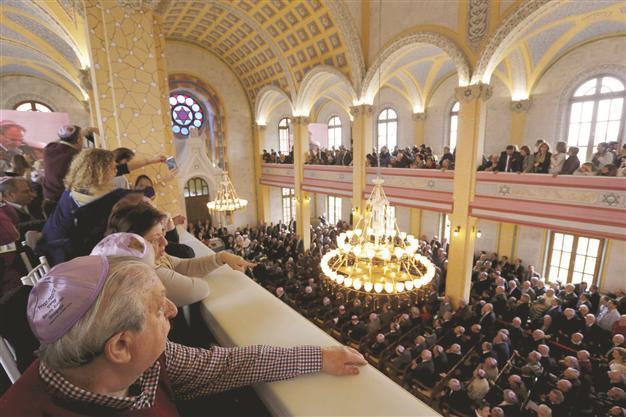Renovated synagogue empty after reopening as it lacks community
Selin Nasi* EDİRNE

Members of Turkey’s Jewish community attend the reopening ceremony of the Great Synagogue in Edirne on March 26 after a five-year government restoration project. REUTERS Photo
Just a week before Passover, Turkish Jews woke up to a morning full of excitement and hope. They got on the buses waiting to take them to Edirne, to the city that their families once had to leave following the Thrace pogroms in 1934. It was the reopening day of the Great Synagogue, which had been left in ruins for decades.“I was the last rabbi that had served in the synagogue,” said David Azuz. “The last time I opened the doors was back in 1969.”
Now, after decades, the first sermon was going to take place. Yet, sadly enough, the next day silence would fall all over the temple again since there was no longer a Jewish community living in Edirne to gather for prayers.
As the largest Jewish temple in the Balkans and the third largest in Europe, the Great Synagogue looked like it did in its glory days with sublime domes, painted in sunshades of yellow, after five years of restoration. The cost of the project undertaken by the Directorate General of Foundations was an estimated 3.7 million dollars.
Since it is the first temple to open in Turkish republican history, it is fair enough to consider the government’s initiative as path-breaking. This move came at a time when there was an ongoing debate about whether the Turkish Jews were leaving Turkey as a result of rising anti-Semitism. It is true that anti-Semitic incidents have showed a steady incline since the Mavi Marmara Incident in 2010, parallel to the deterioration of Turkish-Israeli relations, and peaked during the Gaza War last summer.
Jews labeled as foreigners
Unfortunately, Turkish Jews who have been considered as having organic ties to Israel are labeled as foreigners. Thus, they are subject to hate speech and threats almost on a daily basis whenever there is a crisis between Israel and Palestine. It was only a couple of months ago that the governor of Edirne threatened to stop the renovation process of the Great Synagogue in response to the incidents at the al-Aqsa Mosque in Jerusalem.
The uneasy conditions of being a Jew in Turkey were perhaps best described by İzak İbrahimzade, the head of Jewish community, in his opening speech at the Great Synagogue. İbrahimzade argued that the false and misleading narratives created during the fall of the Ottoman Empire, which served for nation-building, presented minorities as the enemies from within.
“The same mindset, which sees religious minorities as traitors, continues to shape perceptions toward the Turkish Jews,” said İbrahimzade, adding that they had thus been forced to prove themselves as loyal and beneficial citizens to the state and society each and every time they faced such false accusations.
As such, the reopening of the Great Synagogue meant a lot for the Jewish community as a resolute response from the government to all kinds of anti-Semitism.
In this respect, Deputy Prime Minister Bülent Arınç’s remarks at the opening ceremony were encouraging. Referring to official commemorations this year of the Holocaust and Struma incident, in which Jews fleeing the Holocaust were killed on the Black Sea, Arınç highlighted the government’s efforts to fight anti-Semitism by creating a consciousness about the Jewish peoples’ sufferings. He added that a Jewish and a Christian have equal shares with a Muslim upon these lands.
The crowds that filled the synagogue genuinely wanted to believe in Arınç. Above everything else, they needed to be recognized as one of the constituents of Turkish society who shared a history and who also plan a shared future on these lands. It was therefore a day of hope. On our way to Edirne, Ida Romano’s words echoed in our heads when she said, “We used to have such a beautiful life, I left my heart in Edirne.”
Before the opening ceremony, the Jewish community paid a visit to the ancient cemetery. Among the group, there were visitors from foreign countries, checking names on the headstones in the cemetery, hoping to come across their long-lost relatives, in search of family ties. Just as the Kadish prayer started for the commemoration of the losses, a man in his late 50s shouted: “There it is! I’ve found my grandpa’s grave!”
To his surprise, his grandpa, Pinhas Taranto, passed away 55 years ago, on the same day the Grand Synagogue reopened, on March 26.
*Selin Nasi is a Şalom columnist and PhD student at Boğaziçi University’s Political Science Department.
















